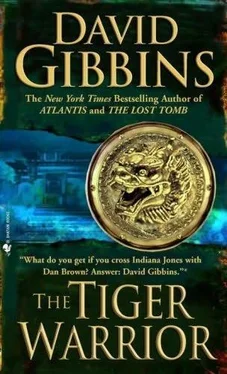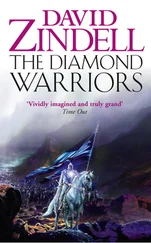David Gibbins - The Tiger warrior
Здесь есть возможность читать онлайн «David Gibbins - The Tiger warrior» весь текст электронной книги совершенно бесплатно (целиком полную версию без сокращений). В некоторых случаях можно слушать аудио, скачать через торрент в формате fb2 и присутствует краткое содержание. Жанр: Прочие приключения, на английском языке. Описание произведения, (предисловие) а так же отзывы посетителей доступны на портале библиотеки ЛибКат.
- Название:The Tiger warrior
- Автор:
- Жанр:
- Год:неизвестен
- ISBN:нет данных
- Рейтинг книги:4 / 5. Голосов: 1
-
Избранное:Добавить в избранное
- Отзывы:
-
Ваша оценка:
- 80
- 1
- 2
- 3
- 4
- 5
The Tiger warrior: краткое содержание, описание и аннотация
Предлагаем к чтению аннотацию, описание, краткое содержание или предисловие (зависит от того, что написал сам автор книги «The Tiger warrior»). Если вы не нашли необходимую информацию о книге — напишите в комментариях, мы постараемся отыскать её.
The Tiger warrior — читать онлайн бесплатно полную книгу (весь текст) целиком
Ниже представлен текст книги, разбитый по страницам. Система сохранения места последней прочитанной страницы, позволяет с удобством читать онлайн бесплатно книгу «The Tiger warrior», без необходимости каждый раз заново искать на чём Вы остановились. Поставьте закладку, и сможете в любой момент перейти на страницу, на которой закончили чтение.
Интервал:
Закладка:
A ragged volley erupted from the riverbank, but no sound of bullets overhead. “Matchlocks again, Sergeant. Hold your fire.”
Wauchope peered over the metal plate at the smoke. “Where do they get their powder?”
“When I took my first party into the jungle last week, I searched a village and seized their guns, all matchlocks,” Howard replied. “The women were making saltpeter by urinating into bags of manure suspended over pans, and then letting the liquid that seeped out crystallize. Ingenious, really. They’re always burning jungle to open up new patches for cultivation so they have plenty of charcoal, and sulphur they get from traders. The powder’s pretty poor, but it’s good enough for small game. Some of them also get powder and ball from the lowland moneylenders who enslave them in debt. But I fear they now have a new source of weapons.”
A bullet smacked against the smokestack of the steamer, causing an almighty clang, followed by a sharper crack from the shore. “Speak of the devil.” Howard peered through his glass again. “An old East India Company percussion musket, native police issue. Some of the constables have supplied the rebels with arms and ammunition in return for their own safety. The police really are perfectly useless. They can be trusted to do nothing, they are disobedient and insubordinate. But Government wishes us to employ them. That’s what happens when a war is run by clerks in Calcutta. And there’s another problem. In the infantry regiments deployed in the field force, there are sepoy officers who still can’t use maps properly, even the rudimentary ones we’ve made of this place. Without a map and bearings you’re lost in the jungle. But all of our sappers are excellent map readers. So here we are, the Queen’s Own Sappers and Miners, employed as infantry and police. It really is a most lamentable state of affairs.”
“What’s the quality of the official maps?”
Howard snorted. “That’s the final rub. We’ve had to make them up as we go along. When Lieutenant George Everest came here in 1809 with the Great Trigonometric Survey, they hadn’t even set up their trig posts on the hills before they were all struck down by fever. Half of them perished, and Everest never came back. This place is a great black hole smack in the middle of India. It may as well be Baluchistan, or the depths of central Asia.” He glanced at the foredeck, and saw O’Connell glaring at him, his lower lip quivering. “Very well, Sergeant, bring your men to the ready. Another ball in our direction and you can open fire. First volley above their heads. Wait for my command.”
“Sir.” O’Connell instantly barked an order in Hindi and the line of rifles came up to the horizontal along the deck railing, followed by the clicks of hammers being pulled back to full-cock. O’Connell was positively chomping at the bit, breathing like a bull ready to charge.
“I had a look at your native fellow when I came on board.” Wauchope pointed his pipe at the man. “The pendant in his ear’s a Roman coin, you know. Do you remember when we were cadets, I took you to the coin room in the British Museum? It’s very worn, but I think it’s from the time of the Roman Republic, possibly Julius Caesar.”
“You come across them around Bangalore, and farther south,” Howard said. “Edward’s ayah has one, a gold coin. I’m told the Romans traded them for pepper.”
“Who is he, anyway, our Koya friend?” Wauchope angled his pipe again.
“He’s a muttadar, a local headman from Rampa, the village that gives its name to the district. He holds some kind of grudge against Chendrayya, the leader of the revolt. The muttadar acts from motives of self-interest. Once satisfied on that point, his time and labor have been most zealously and indefatigably given, when he’s been sober enough.” Howard lowered his voice. “He’s also a vezzugada, a sorcerer. The Koya know nothing of the Hindu religion. They worship deities of their own, ancient Dravidian gods, animistic gods and goddesses. Tigers, hyenas, buffalo. Sometimes the deities possess people, who are known then as the konda devata. Sacrifices are made to a dread deity called Ramaya. That hollow bamboo he’s holding supposedly contains some kind of idol, the supreme velpu. He calls it the Lakkala Ramu, and it’s rumored to be ornamented with eyes of olivine and lapis lazuli. He won’t show it to anyone. It’s supposed to be kept in a sacred cave, a shrine near Rampa village, to placate the deity. The muttadar took it from the shrine when he fled Chendrayya and came to us. But now the deity needs it back, and is apparently becoming agitated. Our side of the bargain is to help the muttadar replace it.”
“Will you keep your promise?”
“Of course. We need to instill fear among the rebels, and confidence among those who are well-disposed toward us.”
“Quite so.”
There was a sudden commotion and a curse, and a hatch into the hold opened behind them. An indescribable smell wafted out, followed by a burly man stripped to the waist except for a luridly stained apron. He was only a few years older than the two subalterns, the same age as Sergeant O’Connell, and like O’Connell sported the long sideburns fashionable among a previous generation.
“Surgeon Walker,” Howard said, looking at the man with concern. “How goes it in the black hole?”
“Most of the men have had repeated malarious attacks, and are in a very debilitated state.” Walker spoke with the hard consonants of his birthplace, Kingston in Upper Canada, and six years at the Queen’s University in Belfast. “There are serious after consequences-enlarged spleen, anemia, partial paralysis, extreme emaciation, disorders of the stomach and bowels, and other complaints of a grave nature. Many of the men are passing through the hot stage of a febrile paroxysm, and their sufferings and distress are painful to witness.”
“That vile odor?”
“Indeed. A singular putrid efflorescence.” Walker wiped something unpleasant off his hand onto his apron. “I’m here for a breath of fresh air. Is Lieutenant Hamilton back yet?”
Howard shook his head and pulled out his fob watch. “He’s been gone a full twenty-four hours now. He doesn’t have provisions for any longer.” He turned to Wauchope. “One of the muttadar’s men informed us that Chendrayya had been seen in Rampa village about five miles north of here. I sent Hamilton out with what remains of G Company, only 22 men. It was a risk, but we’ve rarely encountered the rebels in gangs of more than 10 or 20. Until now, that is.”
“Let’s hope Hamilton doesn’t walk into that lot,” Wauchope murmured, jerking his head toward the riverbank.
Howard grunted. “I just wish he hadn’t taken the infernal Bebbie with him.”
“Who?”
“Assistant commissioner for the Central Provinces.” Howard paused, trying to control his temper. “Because government in its wisdom decided that this is a police action, all of our forays into the tribal agency are supposed to be led by a civil officer. Some are decent fellows, fine shots. Mr. Bebbie is decidedly not one of those. He gave us a lecture before we set out. How climate will always prevent this being the seat of prosperous industry or great commercial enterprise. How the Koya are a degenerate race, sunk in the depths of ignorance and superstition. How it is his duty to teach them the value of a moral obligation, and our duty not to upbraid them with the past but to inaugurate them with a better future. His lecture was a magnificent display of language united to a grievous perversion of the facts. It failed to conceal the truth that he’s never bothered to come up here into his jurisdiction before and is permanently prostrate with fever. A more worthless specimen and perfectly useless leader of men I have not seen.”
Читать дальшеИнтервал:
Закладка:
Похожие книги на «The Tiger warrior»
Представляем Вашему вниманию похожие книги на «The Tiger warrior» списком для выбора. Мы отобрали схожую по названию и смыслу литературу в надежде предоставить читателям больше вариантов отыскать новые, интересные, ещё непрочитанные произведения.
Обсуждение, отзывы о книге «The Tiger warrior» и просто собственные мнения читателей. Оставьте ваши комментарии, напишите, что Вы думаете о произведении, его смысле или главных героях. Укажите что конкретно понравилось, а что нет, и почему Вы так считаете.












